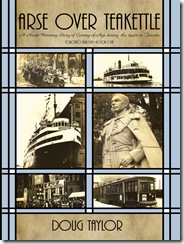The following passage is from the book “Arse Over Teakettle,” a tale of a family struggling to cope during the war years. The quote ably describe the attitude of most Canadians toward the dark, rainy days of November.
In swift progression, autumn’s damp mist caressed my face, and once more, I experienced nature’s mellow season, when mahogany chestnuts and tight-capped acorns dropped to the leaf-strewn ground. Wild asters in the vacant lots near our home pushed their delicate heads skyward, adding their purple pastels to the sun-filled afternoons.
As the fall season drew to a close, November’s dour days appeared, with heavy storm clouds scuttling across pewter skies. I heard the melancholy cry of a solitary bugler sound the “Last Post” in the Remembrance Day ceremony, held each year in the basement of our school. As the days of autumn ended, cold dominated the land, heralding the advent of a long, Toronto winter. The frosts of December seized the land. On the snow-clad hills of Fairbank Park, I heard the laughter of friends as they tobogganed down the frozen slopes. As the poet penned:
All in November’s soaking mist
We stand and prune the naked tree,
While all our love and interest
Seems quenched in blue-nosed mist.
Ruth Ritter
Dreary November is the bane of every Torontonian’s existence. As a child, I hated the dark, dirty month. Damp grey days and vaporous nights fell across the land. Killing frosts blackened any remaining flowers in the garden, adding to the month’s dismal display.
Each morning, on my way to school, I turned up my collar and hunched my shoulders against the biting breath of the wind. On the days it rained, adults I passed on the street were huddled under dripping umbrellas. Sodden leaves littered the gutters and roadways. Large droplets splattered against windowpanes, and dribbled down the glass like tears. The moaning winds ascended to cathedral skies like a discordant medieval chant, offered by monks who despised the song.
Succinctly stated, November sucks.
